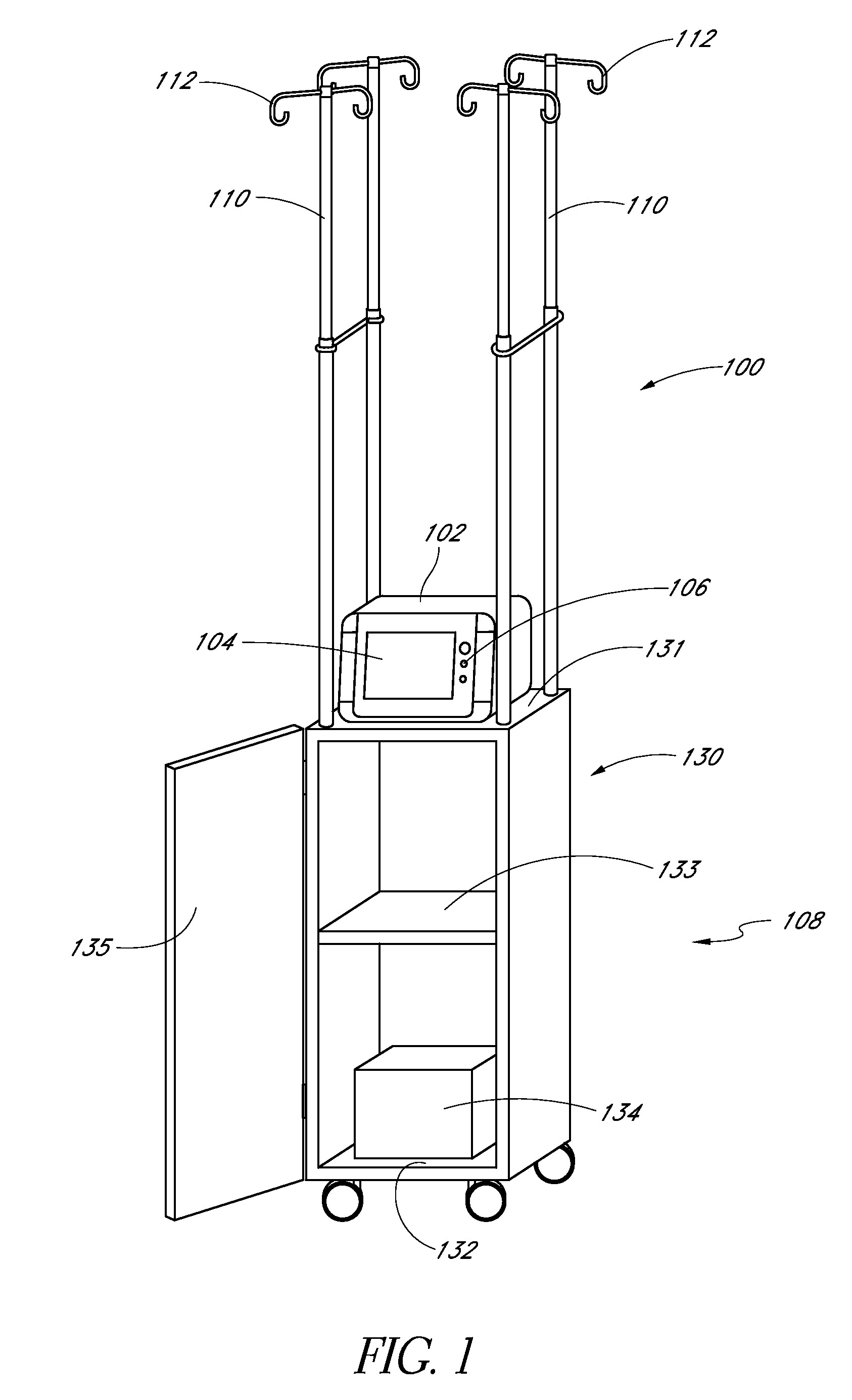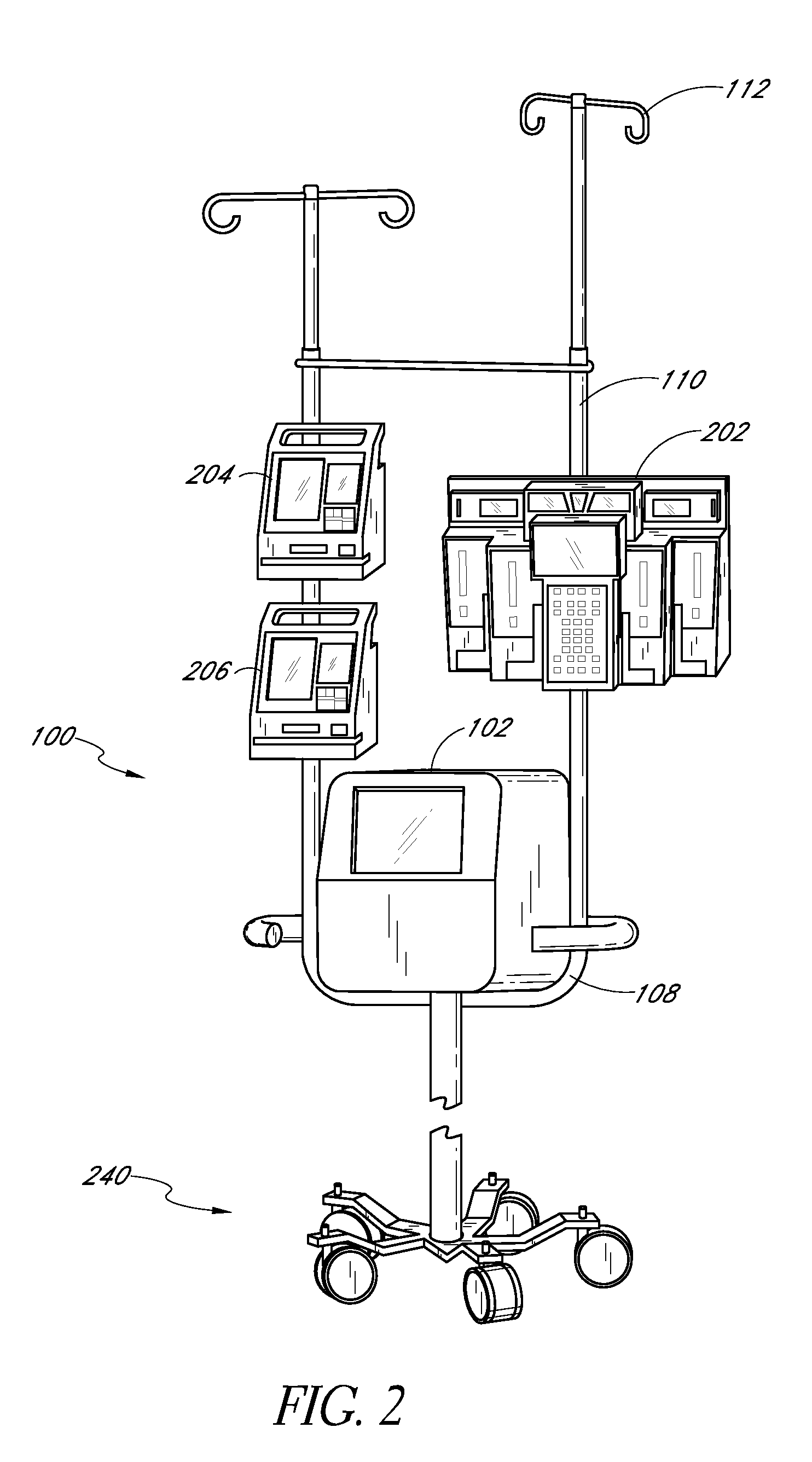Adjustable connector, improved fluid flow and reduced clotting risk
a technology of fluid flow and adaptable connectors, which is applied in the field of adaptable connectors, can solve the problems of affecting the health of patients, fluid accumulation or clogging of patient connectors, and the system of analyte monitoring in a hospital or clinical setting may suffer, so as to improve the seal, reduce leakage, and reduce the effect of leakag
- Summary
- Abstract
- Description
- Claims
- Application Information
AI Technical Summary
Benefits of technology
Problems solved by technology
Method used
Image
Examples
example experiment 1
[0246]In this example experiment, a partial least squares (PLS) regression method was applied to the infrared target spectra of the target patients' blood plasma to obtain the glucose estimates. In example experiment 1, estimated glucose concentration was not corrected for effects of interferents. The Sample Population used for the analysis included infrared spectra and independently measured glucose concentrations for 92 individuals selected from the general population. This Sample Population will be referred to as a “Normal Population.”
example experiment 2
[0247]In example experiment 2, an embodiment of the Parameter-Free Interferent Rejection (PFIR) method was used to estimate glucose concentration for the same target population of patients in example experiment 1. The Sample Population was the Normal Population. In this example, calibration for Library Interferents was applied to the measured target spectra. The Library of Interferents included spectra of the 59 substances listed below:
Acetylsalicylic AcidHetastarchPyruvate SodiumAmpicillinHuman AlbuminPyruvic AcidSulbactamAzithromycinHydroxy Butyric AcidSalicylate SodiumAztreonamImipenem CilastatinSodium AcetateBacitracinIohexolSodium BicarbonateBenzyl AlcoholL_ArginineSodium ChlorideCalcium ChlorideLactate SodiumSodium CitrateCalcium GluconateMagnesium SulfateSodium ThiosulfateCefazolinMaltoseSulfadiazineCefoparazoneMannitolUreaCefotaxime SodiumMeropenemUric AcidCeftazidimeOxylate PotassiumVoriconazoleCeftriaxonePhenytoinXylitolD_SorbitolPhosphates PotassiumXyloseDextranPiperacill...
example experiments 3 and 4
[0252]Example experiments 3 and 4 use the analysis methods of example experiments 1 and 2, respectively (PLS without interferent correction and PFIR with interferent correction). However, example experiments 3 and 4 use a Sample Population having blood plasma spectral characteristics different from the Normal Population used in example experiments 1 and 2. In example experiments 3 and 4, the Sample Population was modified to include spectra of both the Normal Population and spectra of an additional population of 55 ICU patients. These spectra will be referred to as the “Normal+Target Spectra.” In experiments 3 and 4, the ICU patients included Surgical ICU patients, Medical ICU patients as well as victims of severe trauma, including a large proportion of patients who had suffered major blood loss. Major blood loss may necessitate replacement of the patient's total blood volume multiple times during a single day and subsequent treatment of the patient via electrolyte and / or fluid repl...
PUM
 Login to View More
Login to View More Abstract
Description
Claims
Application Information
 Login to View More
Login to View More - R&D
- Intellectual Property
- Life Sciences
- Materials
- Tech Scout
- Unparalleled Data Quality
- Higher Quality Content
- 60% Fewer Hallucinations
Browse by: Latest US Patents, China's latest patents, Technical Efficacy Thesaurus, Application Domain, Technology Topic, Popular Technical Reports.
© 2025 PatSnap. All rights reserved.Legal|Privacy policy|Modern Slavery Act Transparency Statement|Sitemap|About US| Contact US: help@patsnap.com



